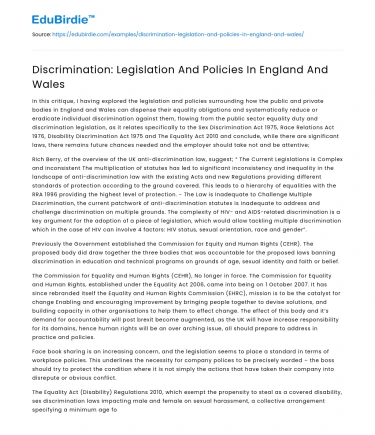Introduction
Discrimination remains a pervasive issue in modern societies, manifesting in various domains including employment, education, and public services. In England and Wales, legislation and policies have been developed to combat discrimination and promote equality. The Equality Act 2010 is a cornerstone of this legal framework, aiming to consolidate and simplify anti-discrimination laws. Despite these legal measures, debates continue regarding their effectiveness and implementation. Some argue that while legislation provides a robust framework, real-world disparities persist, necessitating ongoing policy evolution. This essay explores the legislative landscape in England and Wales, examines case examples, and discusses the efficacy and challenges of anti-discrimination policies. By addressing both the strengths and limitations of current frameworks, we can better understand the complexities of achieving genuine equality.
Legislative Framework: The Equality Act 2010
The Equality Act 2010 represents a significant milestone in anti-discrimination legislation in England and Wales. It consolidates over 116 separate pieces of legislation into a single Act, providing a comprehensive legal framework to protect individuals from unfair treatment. This Act covers various protected characteristics, including age, disability, gender reassignment, race, religion, sex, and sexual orientation. One of the Act's key strengths is its broad applicability, ensuring protection across multiple spheres of life—from employment to education and beyond.
A notable case exemplifying the Act's application is the landmark decision in Lee v Ashers Baking Company Ltd (2018), where the Supreme Court ruled that the bakery's refusal to make a cake with a pro-gay marriage slogan constituted direct discrimination based on sexual orientation. This case underscores the Act's role in addressing complex discrimination issues and balancing competing rights.
However, critics argue that despite the Act's comprehensive nature, its enforcement mechanisms remain inadequate. The Equality and Human Rights Commission (EHRC) is tasked with enforcing the Act, yet limited resources and enforcement powers hinder its effectiveness. As noted by Fredman (2011), "the Act's success depends not just on its provisions but on effective enforcement and public awareness." Therefore, while the Equality Act 2010 provides a robust legislative foundation, ensuring its practical impact necessitates stronger enforcement strategies.
Policy Implementation and Real-World Impact
Beyond legislation, policies in England and Wales aim to translate legal principles into tangible outcomes. The Public Sector Equality Duty (PSED), introduced under the Equality Act 2010, requires public bodies to consider how their decisions and policies affect individuals with different protected characteristics. This proactive approach seeks to embed equality considerations into the fabric of public decision-making.
Despite such initiatives, evidence suggests that disparities persist in practice. A report by the Equality and Human Rights Commission (2018) highlights ongoing inequalities in areas such as pay, employment opportunities, and access to services. For instance, the gender pay gap remains a significant issue, with women earning on average 15.5% less than men as of 2020, according to the Office for National Statistics (ONS).
Critically, the effectiveness of policies like the PSED hinges on rigorous monitoring and accountability. Without these, as Barmes (2015) argues, "policies risk becoming box-ticking exercises rather than transformative measures." Therefore, while policies complement legislative efforts, achieving substantive change requires a commitment to robust monitoring and evaluation frameworks.
Counter-Arguments and Ongoing Challenges
While the legislative and policy frameworks in England and Wales provide a strong foundation for combating discrimination, critics highlight several areas for improvement. One argument is that the focus on individual rights may overshadow systemic inequalities that require broader structural changes. For example, intersectionality—considering how various forms of discrimination intersect—is not explicitly addressed in current legislation, limiting its scope in tackling complex discrimination cases.
Additionally, the socio-political climate can influence the implementation of anti-discrimination measures. Economic austerity measures, for instance, have been argued to disproportionately impact marginalized groups, exacerbating existing inequalities. As noted by O’Cinneide (2012), "economic pressures can lead to a retrenchment of equality initiatives," highlighting the need for sustained political and financial commitment to anti-discrimination efforts.
Moreover, critics argue that the focus on legal compliance may overshadow the cultural and attitudinal changes needed to combat discrimination effectively. As Crenshaw (1989) emphasizes, "laws alone cannot change societal attitudes—education and awareness are crucial." Thus, while legislative frameworks are essential, fostering a culture of equality and inclusivity requires comprehensive strategies that extend beyond legal measures.
Conclusion
In conclusion, the legislative and policy frameworks in England and Wales reflect significant progress in addressing discrimination and promoting equality. The Equality Act 2010 provides a comprehensive legal foundation, while policies like the PSED aim to integrate equality considerations into public decision-making. However, challenges remain in ensuring effective enforcement, addressing systemic inequalities, and fostering cultural change. As this essay has demonstrated, achieving genuine equality requires a multifaceted approach, combining robust legislation with effective implementation, monitoring, and cultural education. Moving forward, continuous evaluation and adaptation of these frameworks are crucial to addressing emerging challenges and fostering a more equitable society. By acknowledging both the successes and limitations of current efforts, policymakers and stakeholders can work towards a future where equality is not just a legal principle but a lived reality for all individuals.






 Stuck on your essay?
Stuck on your essay?

